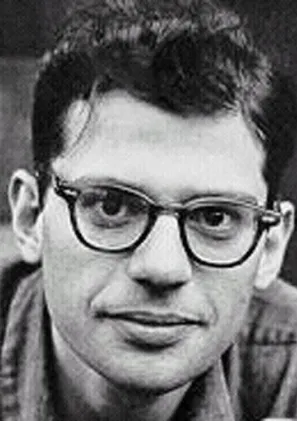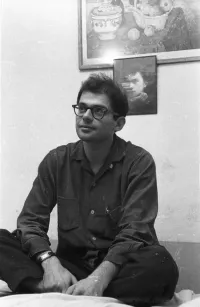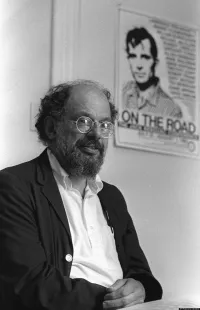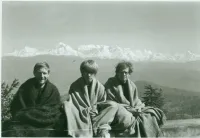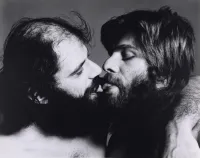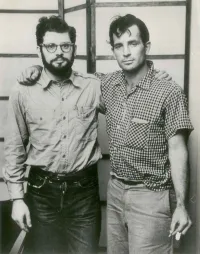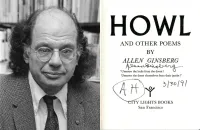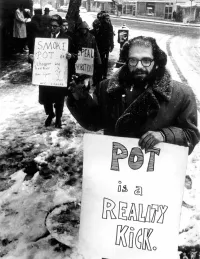Biography
1926 - 1997
"Whoever controls the media, the images, controls the culture."
- Allen Ginsberg
"I saw the best minds of my generation destroyed by madness, starving hysterical naked, dragging themselves through the negro streets at dawn looking for an angry fix..." begins Ginsberg's 'Howl’ and when he spoke those words at San Francisco’s Six Gallery one October night in 1955, the definitive poet of the Beat Generation was born. The blatant gay content was shocking and printed copies of Howl and Other Poems (1956) were seized by police as obscene, though ultimately the court ruled its publication had redeeming social value. Ginsberg discovered the power of verse after hearing a high school teacher read Walt Whitman, and was changed forever upon meeting his discontented beat brothers, Jack Kerouac and Neal Cassady. Openly gay, Ginsberg became the guru of the youth counterculture movement in the 1960s and 1970s - a bop poet preaching for sexual liberation, drug experimentation, love, and solidarity among non-conforming members of society. Ever the pacifist, Ginsberg chanted ‘Om’ on stage amidst the riots in Chicago’s Grant Park in 1968. His work Kaddish (1959) models the traditional Jewish memorial service for the dead into a piece about his schizophrenic mother. In 1974 he won the National Book Award for The Fall of America. His additional books of poetry include Reality Sandwiches (1963) and Mind Breaths (1978). Accompanied by Peter Orlovsky, his partner for over 40 years, Ginsberg spent the latter years of his life travelling the world. Realizing his life had been a spiritual quest in all forms, he eventually found great solace in meditation. Poet, activist, public figure – and for many an unrivaled icon to this day – Ginsberg died of liver cancer in New York City at the age of 70.
1926 - 1997
"Whoever controls the media, the images, controls the culture."
- Allen Ginsberg
"I saw the best minds of my generation destroyed by madness, starving hysterical naked, dragging themselves through the negro streets at dawn looking for an angry fix..." begins Ginsberg's 'Howl’ and when he spoke those words at San Francisco’s Six Gallery one October night in 1955, the definitive poet of the Beat Generation was born. The blatant gay content was shocking and printed copies of Howl and Other Poems (1956) were seized by police as obscene, though ultimately the court ruled its publication had redeeming social value. Ginsberg discovered the power of verse after hearing a high school teacher read Walt Whitman, and was changed forever upon meeting his discontented beat brothers, Jack Kerouac and Neal Cassady. Openly gay, Ginsberg became the guru of the youth counterculture movement in the 1960s and 1970s - a bop poet preaching for sexual liberation, drug experimentation, love, and solidarity among non-conforming members of society. Ever the pacifist, Ginsberg chanted ‘Om’ on stage amidst the riots in Chicago’s Grant Park in 1968. His work Kaddish (1959) models the traditional Jewish memorial service for the dead into a piece about his schizophrenic mother. In 1974 he won the National Book Award for The Fall of America. His additional books of poetry include Reality Sandwiches (1963) and Mind Breaths (1978). Accompanied by Peter Orlovsky, his partner for over 40 years, Ginsberg spent the latter years of his life travelling the world. Realizing his life had been a spiritual quest in all forms, he eventually found great solace in meditation. Poet, activist, public figure – and for many an unrivaled icon to this day – Ginsberg died of liver cancer in New York City at the age of 70.
Demography
Demography
Gender Male
Sexual Orientation Gay
Gender Identity Cisgender
Ethnicity Caucasian/White Jewish
Faith Construct Buddhist
Nations Affiliated United States France
Era/Epoch Cold War (1945-1991) Homophile Movement (1945-1969) Information Age (1970-present) Post-Stonewall Era (1974-1980)
Field(s) of Contribution
Author
Poet
Social Justice
Commemorations & Honors
Guggenheim Fellowship (1965)
National Book Award for Poetry for The Fall of America: Poems of These States (1974)
National Arts Club Gold Medal Recipient (1979)
American Academy Arts and Letters Inductee (1979)
Robert Frost Medal (1986)
Chevalier des Arts et des Lettres From the French Minister of Culture Recipient (1993)
Lifetime Literary Achievement Award (1996)
Inaugural San Francisco Rainbow Honor Walk Honoree (2014)
Demography
Gender Male
Sexual Orientation Gay
Gender Identity Cisgender
Ethnicity Caucasian/White Jewish
Faith Construct Buddhist
Nations Affiliated United States France
Era/Epoch Cold War (1945-1991) Homophile Movement (1945-1969) Information Age (1970-present) Post-Stonewall Era (1974-1980)
Field(s) of Contribution
Author
Poet
Social Justice
Commemorations & Honors
Guggenheim Fellowship (1965)
National Book Award for Poetry for The Fall of America: Poems of These States (1974)
National Arts Club Gold Medal Recipient (1979)
American Academy Arts and Letters Inductee (1979)
Robert Frost Medal (1986)
Chevalier des Arts et des Lettres From the French Minister of Culture Recipient (1993)
Lifetime Literary Achievement Award (1996)
Inaugural San Francisco Rainbow Honor Walk Honoree (2014)
Resources
Resources
Avi-Ram, Amitai. "Free Verse in Whitman and Ginsberg: The Body and the Simulacrum." The Continuing Presence of Walt Whitman: The Life After the Life. Robert K. Martin, ed. Iowa City: University of Iowa Press, 1992. 93-113.
Berman, Paul. "Intimations of Mortality." Parnassus 8.1 (1979): 283-293.
Martin, Robert K. The Homosexual Tradition in American Poetry. Austin: University of Texas Press, 1979. 165-170.
Schumacher, Michael. Dharma Lion. New York: St. Martin's Press, 1992.
http://www.poets.org/poet.php/prmPID/8
https://en.wikipedia.org/wiki/Allen_Ginsberg
https://www.brainpickings.org/2016/06/03/allen-ginsberg-coming-out/
https://hyperallergic.com/504644/christopher-street-pride-parade-allen-ginsberg-hank-oneal/
Resources
Avi-Ram, Amitai. "Free Verse in Whitman and Ginsberg: The Body and the Simulacrum." The Continuing Presence of Walt Whitman: The Life After the Life. Robert K. Martin, ed. Iowa City: University of Iowa Press, 1992. 93-113.
Berman, Paul. "Intimations of Mortality." Parnassus 8.1 (1979): 283-293.
Martin, Robert K. The Homosexual Tradition in American Poetry. Austin: University of Texas Press, 1979. 165-170.
Schumacher, Michael. Dharma Lion. New York: St. Martin's Press, 1992.
http://www.poets.org/poet.php/prmPID/8
https://en.wikipedia.org/wiki/Allen_Ginsberg
https://www.brainpickings.org/2016/06/03/allen-ginsberg-coming-out/
https://hyperallergic.com/504644/christopher-street-pride-parade-allen-ginsberg-hank-oneal/
